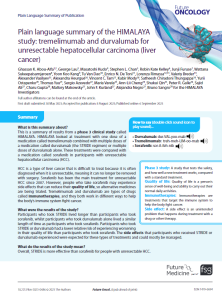 This Plain Language Summary of Publication article from Future Oncology describes the results of a study called HIMALAYA. Unresectable hepatocellular carcinoma (HCC) is a type of liver cancer that is difficult to treat because it is often diagnosed when it is unresectable, meaning it can no longer be removed with surgery. HIMALAYA looked at treatment with one dose of a medication called tremelimumab combined with multiple doses of a medication called durvalumab (the STRIDE regimen) or multiple doses of durvalumab alone.
This Plain Language Summary of Publication article from Future Oncology describes the results of a study called HIMALAYA. Unresectable hepatocellular carcinoma (HCC) is a type of liver cancer that is difficult to treat because it is often diagnosed when it is unresectable, meaning it can no longer be removed with surgery. HIMALAYA looked at treatment with one dose of a medication called tremelimumab combined with multiple doses of a medication called durvalumab (the STRIDE regimen) or multiple doses of durvalumab alone.
Please visit Future Medicine using the link to read the article.
The original article on which this summary is based is called ‘Tremelimumab plus Durvalumab in Unresectable Hepatocellular Carcinoma’ and was published in the New England Journal of Medicine Evidence.
Please visit the New England Journal of Medicine Evidence using the link to read the article.
